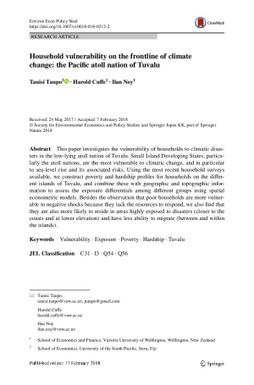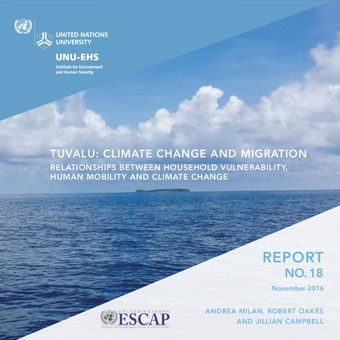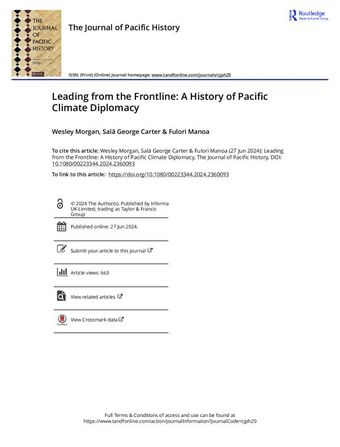Household vulnerability on the frontline of climate change: the Pacific atoll nation of Tuvalu
- Description:
- This paper investigates the vulnerability of households to climatic disasters in the low-lying atoll nation of Tuvalu. Small Island Developing States, particularly the atoll nations, are the most vulnerable to climatic change, and in particular to sea-level rise and its associated risks. Using the most recent household surveys available, we construct poverty and hardship profiles for households on the different islands of Tuvalu, and combine these with geographic and topographic information to assess the exposure differentials among different groups using spatial econometric models. Besides the observation that poor households are more vulnerable to negative shocks because they lack the resources to respond, we also find that they are also more likely to reside in areas highly exposed to disasters (closer to the coasts and at lower elevation) and have less ability to migrate (between and within the islands).
- Display date:
- 2018
- Location:
- Pacific Region
- Collections:
- Secretariat of the Pacific Regional Environment Programme (SPREP)
- Publisher:
- Springer Science and Business Media LLC
- Content partner:
- Secretariat of the Pacific Regional Environment Programme (SPREP)
- Availability:
- Not specified
-
Copyright status: All rights reservedFind out more about what you are able to do with this itemThis item is all rights reserved, with means you'll have to get permission from Secretariat of the Pacific Regional Environment Programme (SPREP) before using it. For more information, please see our use and reuse page.What can I do with this item?Non-infringing useNZ copyright law does not prevent every use of a copyright work, and this item may be hosted by an international institute or organisation. You should consider what you can and cannot do with a copyright work.No sharingYou may not copy and/or share this item with others without further permission. This includes posting it on your blog, using it in a presentation, or any other public use.No modifyingYou are not allowed to adapt or remix this item into any other works.No commercial useYou may not use this item commercially.
Related items
Welcome and warm Pasifik greetings
The information on this site has been gathered from our content partners.
The names, terms, and labels that we present on the site may contain images or voices of deceased persons and may also reflect the bias, norms, and perspective of the period of time in which they were created. We accept that these may not be appropriate today.
If you have any concerns or questions about an item, please contact us.



